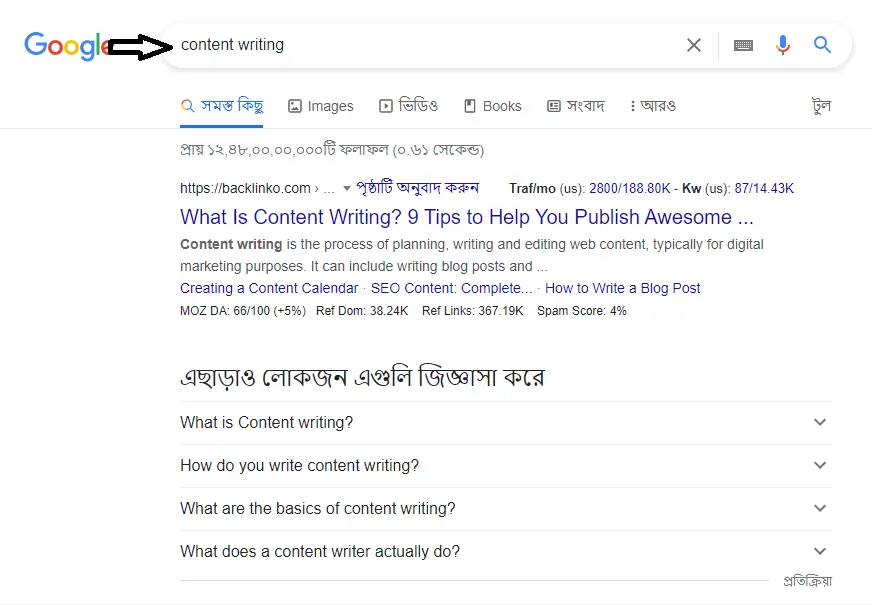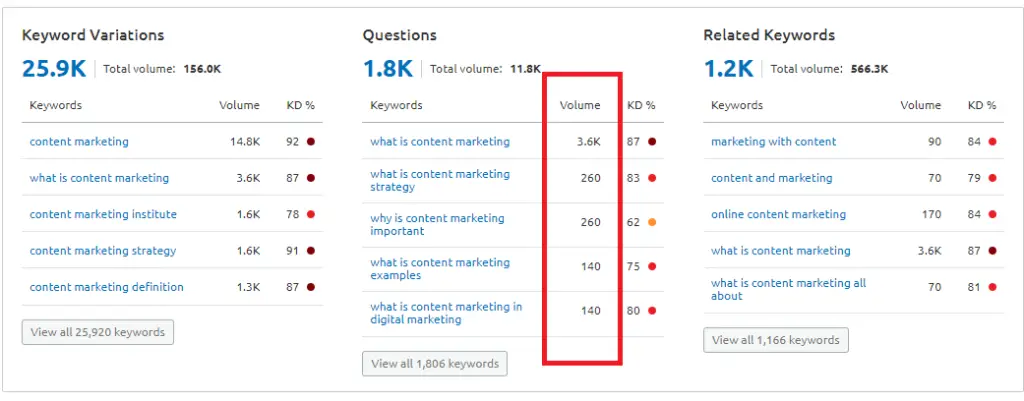While strolling in the world of content writing, the most important question that arises in our mind is, “how do you do keyword research?” Whether you are a freelance content writer or a solo website owner, or a business owner, keywords play a major role in how far your content will reach.
The key essence of a quality piece of writing is the content (as they say, ‘content is king’), but the second most important part is the keywords; and why wouldn’t it be? Keywords are the gateways through which the readers find your site on search engines.
Search engine crawlers are constantly getting information about the contents that are hovering over the internet. When you type something on the little search bar, it is matched with the query, and a list of similar results shows up. However, it is not as simple as it sounds, all thanks to Google or other search engines for constantly changing their algorithms.
With this, we are again back to our old question, why keyword research is so important? Worry not; we are here to walk you through the alleys of optimized keyword research types. Continue reading to know many unanswered ifs and buts about How to do keyword research for niche sites.
Keyword Research: What Does It Mean?
Before diving into the pool of information, it is essential to know what we know about keyword research. What does it mean? The process of keyword research is understanding your target audience’s language and what they basically type in the Google search bar when searching for services. But why is keyword research important?
Well, the answer is simple, you need to know this because you don’t want to write about things that no one’s looking for. If you can’t generate people on your site, you are not getting visible as a company online.
With little or no crowd on your website, the possibility of you making a sale narrows down. But to know what people are looking for, first, you need to have proper knowledge of your industry. What you sell, what you do, information about your services/products, you should remember all these die-hards in order to convey your words to the readers.
It all starts with the seed. I mean the ‘seed’ to accumulate your required keywords.
‘Seed’ Keyword
Seed keywords are short, mostly consist of one or two words, and do not have any modifiers included. Although using a seed keyword in your article will not give you the most fruitful result because of the high competition.
However, you can scrape better keywords with the help of the seed. Other names of the seed keyword are primary keywords, head keywords, main keywords, and root keywords. So if you ever hear these names, they are talking about the seed keyword.
A seed keyword is what is needed to start your keywords hunting process. These words specify your niche and help you find your competitors. Sites that are working with the same ‘seed’ are the ones you compete with.

The keyword research tools will ask for a seed to generate a list of keywords for you. This list can consist of millions of keywords to choose from. From this humongous ( Informal words) list of keywords, you need to do low-competition keyword research to find the best ones for you.
How To Do Low Competition Keyword Research With The Help Of The Seed Keyword?
Obviously, it is a difficult job to find out the best keywords for you from an ocean full of keywords. It may take you days or even months to collect the five best keywords relating to your niche. But thanks to the keyword research tools that make your work a lot easier and less time-consuming.
Several keyword research tools are available in the market with amazing features where you can select keywords based on the relevancy, search volume, search intent, low competition keyword, etc.
You can also sort your list by parent topic keywords (which we will elaborate on later in the article). After you shorten your list of keywords using the keyword research tool, you can filter your desired keywords from the rest by manual keyword research.
Some of the most popular keyword research tools are Ahrefs Keyword Explorer, SEMrush, Majestic, Moz, among others. However, there are free keyword research tools like Google Keyword Planner, ubersuggest, Moz, and others.
Nevertheless, choosing a free keyword tool is not always effective. As we don’t only need traffic at our site, but we want to sell our services to them. Having a more professional approach to finding the keywords is better when we know how important of a role keywords play for our business.
Low Competition Keyword Research
After you find your niche, decide on your topic of writing, and target your possible traffic, it is time for you to put those magic ingredients that will help you generate your audience, The Keywords.
If you can find the right keywords for your site and the search engine is on your side, then connecting with more people should feel like a bed of roses. The same goes for your business website. You can aim at a larger group of people by choosing keywords that relate to the services you provide regardless of the keyword type.
But for this, you have to understand what your goals are. You certainly don’t want to bore your readers by putting repetitive words to push your content to show up as soon as someone is looking for something relative. This will not only aid in losing your readers but also drag you down in search engine optimization (SEO).
Remember that we are not just inviting an audience. We want them to read through the entire article and come back time and time again and buy from the services we offer. You need traffic that converts into sales or possible sales.
So, the idea is to keep it simple and use a variety of similar words reflecting your topic or niche. This will help you engage more readers and also make your article appear on top of search results.
Understanding who you are writing for and what sort of article you are writing is the topmost important part of SEO ranking keyword research. If you are writing cooking blogs, your keywords will be different than the blogs reviewing foods and restaurant websites. You need to know what words people are using while looking for the services you offer.
Also, it would be best if you made sure that the words play a good role in search engine optimization (SEO). The better you choose your keywords, the further you go up in Google’s search engine result pages (SERPs).

By improving your keywords usage, you can see your content reaching the pinnacles you wished for. Keyword research for small businesses helps you extract the most benefit from your current resources.
You will want to choose the keywords that have a higher search value but less competition in the market. This means not a lot of portals are writing about them. If your site is new, you don’t want to engage in competition with popular sites. They have already gathered their audience and popularity in the field.
If someone is looking for a service, they will see the popular sites appearing on top of search results as those sites are popular, have better engagement, know how to utilize the proper keywords, know different keyword research types, hence doing great at their job.
So the idea is to do low competition keyword research. Make sure there are people looking for the topic, but there is not enough quality content on the web regarding those topics.
Low competition keyword research will make it easy for you to rank, you will not need too many of them, and they help you gather a decent amount of traffic every month.
But if everyone is searching keywords the same way, everyone will be finding the same keywords. However, there are some tactful ways to find undiscovered a.k.a untapped keywords.
Untapped Keywords
Untapped keywords are those that not many people have managed to find, the competition is low, and the search traffic is medium to high. These keywords, although they have demands, are less competitive than the obvious targets. However, it is not very simple to find these keywords, or else why would they still be untapped?
Let’s discuss some ways you can find these keywords.
- Target the keywords that your competitors have least used.
- Identify your unique keyword modifier.
- Look for uncommon words or seeds to search for related keywords.
- Trust the keyword research metrics.
The points mentioned above are a few ways to find untapped keywords. However, relying solely upon them is not a good idea. Other aspects like search demand and the traffic potential of the keyword are also important to look for.
Optimize
When you are preparing content, making it look visually pleasing for the visitors shouldn’t be your only motto. Even though it is important, you should as well make your content search engine friendly so that it appears on top when someone is looking for it.
For this, your content should have quality keywords relevant to the niche. If you can do this correctly, you can make your article visible on the top instead of getting lost somewhere on page four. Do you know? Research, based on SEO showed that less than ten percent of people explore the other pages of a search result, and even a larger group of people don’t even scroll down to the bottom results on the first page.
However, gathering audiences on your site is not the ultimate goal. If you can not sell your services or convince people into buying them, then what is the use of all the traffic you managed to accumulate?
To make business happen, you have to optimize your long tail pro keyword research and concentrate more on your niche keyword research. Niche keyword research will help you collect relevant keywords for your targeted audience. Localized keyword research can also work significantly well for your business site.
Your local business keyword research will help people around you know about the services you offer. For example, if you own a fast-food chain, when someone in that area searches for a “fast food place near me,” you want your site to pop up on top. This is what local search keyword research will do.
Also, if someone wants a particular service, they will most likely search for a “fast food place selling vegetarian burgers.” This shows that the person is looking for a specific service and is in need of that service as soon as possible.
Here, long tail pro keyword research plays an important role. Also, you can reach your prospective customer faster with the help of localized keyword research.
Head keywords are also vital for reaching a vast audience. However, head keywords have higher competition. Head keywords are unlike long-tail keywords, and they consist of one to three words.
Keep in mind that the SEO strategy is a long process, and it might take some time for you to see the expected results you want.
Why Are Identifying Keywords Important For Research?
When it comes to keyword implementation, stuffing your content with multiple keywords is not as important as you think, but using the right keyword for your target audience is more important. But first, you have to identify what you are doing with your content. Are you trying to sell your service, educate the readers on some topic, or share information?
Some of the most used commercial keywords are discount, compare, coupon, affordable, and buy now. Prospects search with these keywords when they want to buy something. This means they have money and looking if you have the exact thing which they are looking for.
You can target those keywords and come up with tempting offers from your services which they can not deny. Tell them why they should choose you, why your products are the best, compare with other distinguishable products, and never forget to mention how cheap your prices are. This bait never fails. Buyers are always looking for good things at the lowest price.
However, it is not always the prospective buyers searching for things to buy. Maybe they still don’t know that they need something and may search “when to buy a water heater.” You can target that keyword and write an article with detailed information, pros, and cons of a water heater, electricity consumption, health benefits of using warm water, and more.
At the bottom, you can subtly promote your geyser business by saying you sell all types of water heaters, they cost less, and you even provide the warranty. So now, even though your reader is not sure of whether or not they are getting a water heater but will remember your business and may come back if they change their mind. We will discuss more on keywords type further in our writing.
All in all, incorporating a variety of different keywords is better than stuffing monotonous keywords in your content. Keyword variants not only help keep the readers entertained but also improve organic results. On the other side, you will be penalized for stuffing the same keyword over and over again and never come in rank.
How To Generate Keyword Ideas?
With so much information dwelling all over the internet, how do you know which keywords to add and which one to leave? Well, it is not as difficult as searching for a needle in a haystack if you exactly know what you are looking for. You can either do manual keyword research or use a website to help you ease your task a little.
You can start by typing a few broad keywords related to your niche. Here, you will see all keywords that contain your target keywords. There will be millions of keywords that might make you feel overwhelmed. The good news is you do not need to find too many random keywords. The idea is to filter them down and create a group by the search volume.
What Type Of Keyword Are You Looking For?
There are four main types of keywords for you to work with. These are-
- Informational Keyword
- Navigational Keyword
- Commercial Keyword and
- Transactional Keyword
Wondering what each of these keywords is used for? Let’s get deep into it.
Informational Keyword
Informational keywords are used when the person is looking for information regarding a topic. The searches can include “how to cook pasta,” “how to operate a geyser,” “what are the types of sauces,’ etc. In short, anything that starts with what, why, how are information search queries.
Navigational Keyword
The navigational keyword, as the name suggests, is when the searcher is trying to find a specific thing. It can be a page, a site, any place, etc. It can include names of places, brands, products, services, words, price, cost, and others.
Commercial Keyword
Commercial keywords are used to look for certain brands or any services that they offer. These keywords are generally searched by a potential customer who may be trying to figure out the services in detail.
Transactional Keyword
The transactional keywords are used when the searcher has made up the mind to make a purchase. Here, the searcher does not need too much information around the matter, but they need to know if you can meet their expectations.
Can You Make More Profit By Only Aiming To The Transactional Keywords?
We have to agree most of us think if transactional keywords are what brings in more money, then why not just target on writing such keywords? Well, surprisingly, aiming directly at the transactional keywords will not always help us generate revenue.
As a matter of fact, doing this will limit your reach, and the reason behind that is search value for these keywords are the lowest. At the same time, search values for informational keywords are significantly higher. Moreover, informational content can help you build trust and authority with your prospective clients.
However, if you so decide on choosing transactional keywords, make sure you don’t beat around the bush too much before coming to the point. When a reader has shown interest in your products, it is obvious they are here to give you the money and not here to read so much.
Tell them what services you offer and grab the buyer before they find something more tempting. At this point, a keyword modifier can make your task a little easier.
What Is A Keyword Modifier?
You can further reach your customers by using a keyword modifier. Sometimes keywords alone can not perform as well as with a keyword modifier. Wondering what a keyword modifier is? They are the simple words that are used at the beginning or end of a keyword, like best, top, current year, review, comparison, help, ideas, where, who, how, what, guide, tutorial, tips, examples, and many others. You can use different keyword research tools to filter keywords or can also do manual keyword research.
As mentioned above, using random keywords will not help you in any way. You have to identify if the keyword you decided to use will be useful for your purpose. You can also choose keywords of parent topics.
What Is A Parent Topic?
Parent topics are relative subjects of the keyword you have chosen. There can be millions of keywords on a single topic. You have to see if you can target keywords on a more general topic with the same parent topic. To choose a keyword with the same parent topic, look for the keyword with the highest amount of searches as long as it provides value to your business.
You do not have to choose an informational keyword necessarily. You can link or promote your services in any keyword of your choice relating to your business. Writing about computers will not help to promote your restaurant business.
Analyze Search Results Of Your Keywords
Analyzing your keyword’s Google search result is an extremely important step to keyword research. The top-ranking pages are going to give you information on things like content format. The content format will help you understand how difficult it is going to be for you to rank on Google for your target keyword.
Analyzing the titles on the top-ranking pages will also give you a hint on how they start writing their posts and give you an idea of the number and quality of their backlinks. Analyze their domain rating (DR), the length of their content, its tone, etc. You would want to take inspiration from their writing and carefully follow how they are changing their methods with time. There are even sites with no backlinks attached but doing well in the overall SEO.
How to Do Keyword Research – Final Words
Everything mentioned above will give you a clear idea of the basic concept of keyword research and how to start writing based on the right keywords. However, there are thousands of other ways to gain ideas on this topic.
Keyword research is the ultimate way to make a place of your own as a content writer. Even if you run a business website, keywords help you reach your target audience by understanding their language and showing them exactly what they are looking for. With the correct market research and a list of appealing keywords, you can flourish your path with just a few clicks sitting at your desk.







